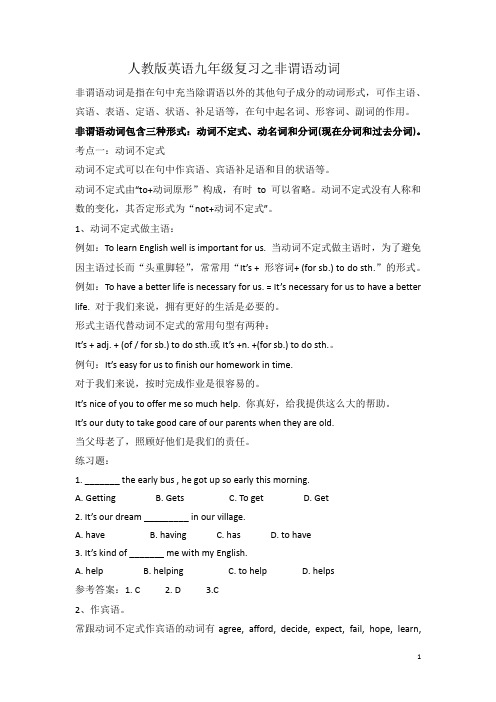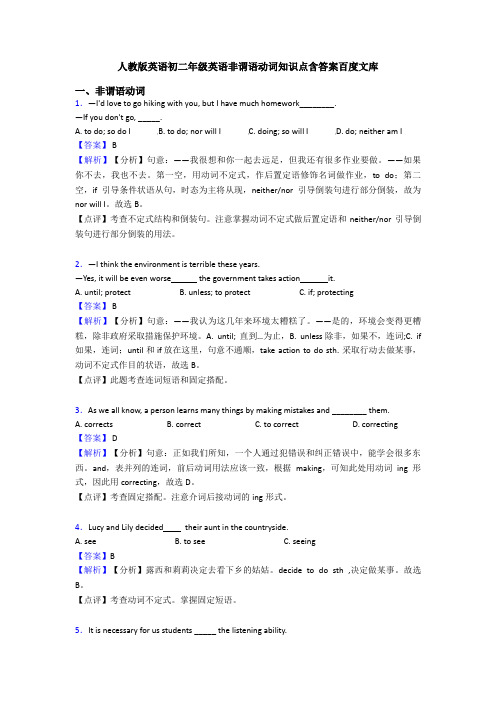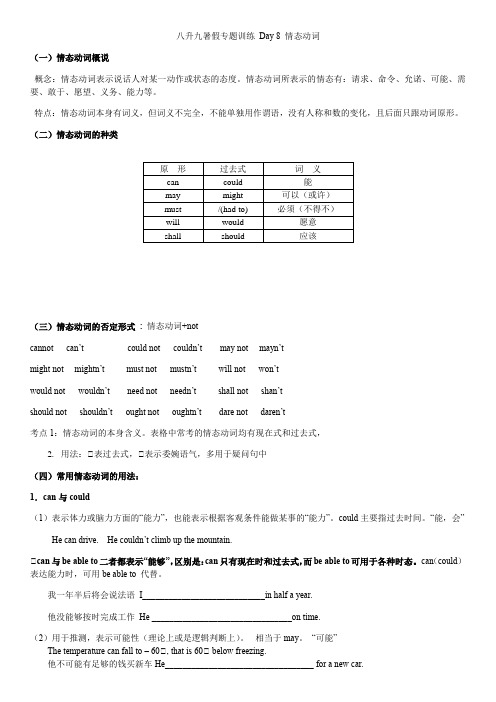2021-2022学年八年级升九年级英语人教版暑假专题讲义:非谓语动词(无答案)
2022-2023学年人教版英语九年级复习语法之非谓语动词(动词不定式)

人教版英语九年级复习之非谓语动词非谓语动词是指在句中充当除谓语以外的其他句子成分的动词形式,可作主语、宾语、表语、定语、状语、补足语等,在句中起名词、形容词、副词的作用。
非谓语动词包含三种形式:动词不定式、动名词和分词(现在分词和过去分词)。
考点一:动词不定式动词不定式可以在句中作宾语、宾语补足语和目的状语等。
动词不定式由“to+动词原形”构成,有时to可以省略。
动词不定式没有人称和数的变化,其否定形式为“not+动词不定式”。
1、动词不定式做主语:例如:To learn English well is important for us. 当动词不定式做主语时,为了避免因主语过长而“头重脚轻”,常常用“It’s + 形容词+ (for sb.) to do sth.”的形式。
例如:To have a better life is necessary for us. = It’s necessary for us to have a better life. 对于我们来说,拥有更好的生活是必要的。
形式主语代替动词不定式的常用句型有两种:It’s + adj. + (of / for sb.) to do sth.或It’s +n. +(for sb.) to do sth.。
例句:It’s easy for us to finish our homework in time.对于我们来说,按时完成作业是很容易的。
It’s nice of you to offer me so much help. 你真好,给我提供这么大的帮助。
It’s our duty to take good care of our parents when they are old.当父母老了,照顾好他们是我们的责任。
练习题:1. _______ the early bus , he got up so early this morning.A. GettingB. GetsC. To getD. Get2. It’s our dream _________ in our village.A. haveB. havingC. hasD. to have3. It’s kind of _______ me with my English.A. helpB. helpingC. to helpD. helps参考答案:1. C 2. D 3.C2、作宾语。
人教版英语初二年级英语非谓语动词知识点含答案百度文库

人教版英语初二年级英语非谓语动词知识点含答案百度文库一、非谓语动词1.—I'd love to go hiking with you, but I have much homework________.—If you don't go, _____.A. to do; so do IB. to do; nor will IC. doing; so will ID. do; neither am I【答案】 B【解析】【分析】句意:——我很想和你一起去远足,但我还有很多作业要做。
——如果你不去,我也不去。
第一空,用动词不定式,作后置定语修饰名词做作业,to do;第二空,if 引导条件状语从句,时态为主将从现,neither/nor引导倒装句进行部分倒装,故为nor will I。
故选B。
【点评】考查不定式结构和倒装句。
注意掌握动词不定式做后置定语和neither/nor引导倒装句进行部分倒装的用法。
2.—I think the environment is terrible these years.—Yes, it will be even worse the government takes action it.A. until; protectB. unless; to protectC. if; protecting【答案】 B【解析】【分析】句意:——我认为这几年来环境太糟糕了。
——是的,环境会变得更糟糕,除非政府采取措施保护环境。
A. until; 直到…为止,B. unless除非,如果不,连词;C. if 如果,连词;until和if放在这里,句意不通顺,take action to do sth. 采取行动去做某事,动词不定式作目的状语,故选B。
【点评】此题考查连词短语和固定搭配。
3.As we all know, a person learns many things by making mistakes and ________ them.A. correctsB. correctC. to correctD. correcting【答案】 D【解析】【分析】句意:正如我们所知,一个人通过犯错误和纠正错误中,能学会很多东西。
2021-2022学年八年级升九年级英语人教版暑假专题讲义:情态动词(无答案)

八升九暑假专题训练Day 8 情态动词(一)情态动词概说概念:情态动词表示说话人对某一动作或状态的态度。
情态动词所表示的情态有:请求、命令、允诺、可能、需要、敢于、愿望、义务、能力等。
特点:情态动词本身有词义,但词义不完全,不能单独用作谓语,没有人称和数的变化,且后面只跟动词原形。
(二)情态动词的种类(三)情态动词的否定形式:情态动词+notcannot --- can’t could not --- couldn’t may not--- mayn’tmight not--- mightn’t must not --- mustn’t will not --- won’twould not --- wouldn’t need not --- needn’t shall not --- shan’tshould not --- shouldn’t ought not --- oughtn’t dare not --- daren’t考点1:情态动词的本身含义。
表格中常考的情态动词均有现在式和过去式,2.用法:①表过去式,①表示委婉语气,多用于疑问句中(四)常用情态动词的用法:1.can与could(1)表示体力或脑力方面的“能力”,也能表示根据客观条件能做某事的“能力”。
could主要指过去时间。
“能,会”He can drive. He couldn’t climb up the mountain.※can与be able to二者都表示“能够”,区别是:can只有现在时和过去式,而be able to可用于各种时态。
can(could)表达能力时,可用be able to 代替。
我一年半后将会说法语I____________________________in half a year.他没能够按时完成工作He ________________________________on time.(2)用于推测,表示可能性(理论上或是逻辑判断上)。
人教版初中英语九年级-非谓语动词讲解-课件

(作主语)
(作宾语)
• 6.I want him to see you. (作宾补)
• 7.My hope is to see you. (作表语)
• 8.He is the man to see you. (作定语)
• 9.I’m glad to see you. (作原因状语)
To see is to believe.
Not to get there in time is your fault. 注:常用it做形式主语,将to do放在位于 之后,使句子保持平衡。
句型1:It + 谓语 + to do It takes us an hour ___ get there by bus.
• B. 常跟疑问词+不定式作宾语的动词: • tell, advise, show, teach, find out,
decide, discuss, learn, explain… know, show, discover, see(understand) • He taught us how to use the tool. • No one could tell me where to get the book. • I hope you’ll advise me what to do. I don't know how to get there.
2.She reached the top of the hill and stopped _______ on a big rock. A. to have rested B. resting C. to rest D. rest
2021-2022学年八年级升九年级英语人教版暑假专题讲义:动词短语(无答案)

八升九暑假综合复习Day 11 动词短语/介词短语总复习动词短语一、与agree有关的短语1.agree to do sth. 同意做某事2.agree with sb. 同意某人的看法3.agree on sth 达成一致()1.My parents like going hiking and they go out with me this Saturday.A .agree to B. agree with C.talk to D .talk with()2.I think your idea is good, so I will you.A.agree toB.agree withC. disagree toD. disagree with二、与be有关的短语1.be angry with生……的气2.be fond of喜欢3.be strict with 对……要求严格4.be interested in对……感兴趣5.be good at 擅长6.be made of(from)由……做成7.be proud of 骄傲,自豪8.be late for 迟到9.be/get used to sth. / doing sth.习惯于(做……)三、与come有关的短语e across(偶然)遇见e back 回来,想起来e down落,下来e from 出生于,来自e on来吧,赶快,加油e to共计,达到e up with想出,追上e out 出版,开花()1.—I heard that your baby had a fever last night. How is she now?—She is all right. Her temperature in the morning.A. came to B .came down C. came on D .came up with ()2.Thomas couldn’t find Alice. But he suddenly a new idea to find her.A.came up withB. came backC. came toD. came on四、与fall有关的短语1.fall behind 落后2.fall down落下3.fall into掉入4.fall asleep 入睡5.fall ill患病()1.Now she her classmates in study and she has to study harder.A.falls behindB.falls downC.falls intoD.falls ill ()2.The boy the water and he got wet all over.A.fell intoB.fell downC.fell behindD.fell ill1.get away逃离2.get back返回,回来,回家3.get together 聚会,联欢4. get down 降下5.get off下车6.get on/along 上车,进展,相处7.get up 起床8.get out of从……出来9.get/be ready for为……做准备10.get close (to) 接近11.get on with sb.与……相处()1.We just from our vacation last night. It was a relaxing one.A.got offB.got awayC.got backD.got up()2.—When do you in the morning? —Always at 7 o’clock.A.get downB.get upC.get togetherD.get away六、与give 有关的短语1.give away捐赠,颁发2.give back 归还3.give out 分发4.give up 放弃()1.She was so kind and she most of her money to the medical research last month.A.gave backB.gave outC.gave upD.gave away()2.Who can help me to these test papers to your classmates?A.give backB.give outC.give upD.give away七、与go 有关的短语1.go away走开,离去2.go by 走过,经过3.go fishing (shopping, skating)去钓鱼(买东西,滑冰)4.go for a walk散步5.go in for 参加,喜欢6.go on 继续7.go on doing /with sth继续做某事8.go out出去,熄灭9.go over 仔细检查,复习10.go through浏览,翻阅,通过()1.When you see someone need help, you can’t , and you’d better come up and help him.A .go away B. go by C .go in for D .go out()2.I would like to with you this Saturday because fishing is one of my hobbies.A. go onB. go throughC. go fishingD.go by八、与hear和pick有关的短语1.hear of 听说2.hear from 收到……来信3.pick out 精心挑选4.pick up 拾起,接人,接电话()1.Have you James? He is a famous basketball player.A.heard from B .named after C. listened to D. heard of()2.I will sent my letter to you and I look forward to you soon.A. seeing offB. hearing ofC. hearing from D .listening to1.ring back 回电话2.ring off 挂断电话,停止讲话3.ring up 打电话给()1.I can’t answer the telephone now; I’ll in an hour.A.ring upB.ring backC.pick upD.ring off()2.Peter misses his dad very much, so he him in Sydney every night.A.rings; upB.rings; backC.picks; upD.rings; off十、与look有关的短语1.look after 照顾2.look around 环顾3.look up 查阅4.look for 寻找5.look into向…里面看,调查6. look out 留神7. look through浏览8.look down upon 轻视9. look forward to 盼望10.look over 检查()1.The doctor the girl carefully and advised her to rest for 2 days and drink more water.A.looked overB.looked upC.looked forD.looked out()2.When the boy heard a strange noise, he but saw nothing.A.looked throughB.looked afterC.looked intoD.looked around十一、与put有关的短语1.put away将…收起2.put down 记下3.put off 推迟4. put on穿,戴5.put on a performance演出6.put on weight 增加体重7. put out 扑灭8.put up 举起;粘贴;搭建()1.Attention, please. The plane has to be because of the heavy rainstorm.A.put upB.put offC.put downD.put away()2.It’s very cold outside.I think you’d better the coat.A.put outB.put onC.put downD.put away十二、与break和carry有关的短语1.break in 破门而入,打断2. break out (战争,打斗等不愉快事件)爆发3.carry on 继续做4.carry out 执行()1.People are not supposed to when the others are talking.A.break downB.break inC.break outD.break up()2.A big fire in our town last Sunday. Fortunately, no one was hurt.A.broke downB.broke inC.broke outD.broke up 十三、与make有关的短语1.make a face 做鬼脸2.make friends with 与….交朋友3.make sure 确定4. make up 化妆,编造,和好5. make up of 由….组成6. make up one’s mind 下定决心()1.The baby is crying. Tom is to cheer it up.A. making sureB. making a faceC.making friendsD.making up his mind ()2.Tom argued with Alice last night. But now they after a talk with each other.A.make upB. put up C .set up D. look up十四、与send有关的短语1.send for 派人去请2.send out 发出,分发十五、与take有关的短语。
2021-2022学年八年级升九年级英语人教版暑假专题讲义:宾语从句(无答案)

八升九暑假专题训练Day2-3 宾语从句一.从句的分类:主语从句宾语从句表语从句同位语从句定语从句状语从句英语从句特点:①复合句句中不能独立成句,但有主语和谓语部分①(必须)由一个关联词引导二.宾语从句定义:在复合句子中作宾语的从句He likes seeing films.He said that he would go to see a film tomorrow.三.宾语从句的基本结构Linda thinks that he is a good student.主语+谓语+关联词+宾语从句剩余部分四.宾语从句的连接词从属连词:that,whether,if疑问代词:who,what,which,whom,whose,whatever,whoever,whichever疑问副词:when,where,how,why1.that的用法that引导宾语从句时,that只起了解作用,其本身在从句中不充当任何成分,在口语或者非正式文体中常被忽略主语+谓语+宾语从句((that)+陈述句)例:I think (that) you should be more careful.注意:下列情况中that不可省略①有多个宾语从句并列时,只能省略第一个that,其他的不能省略例:She said (that) the story was true and that she wouldn’t tell others about it.①当it作形式宾语代替that引导的宾语从句时,that不能省略。
例:They want to make it clear to the public that they do an important job.①在that引导的宾语从句中又含有从句时,that一般不省略例:I think that if you study hard you will pass the test.2.whether/if的用法在对宾语从句所表达的内容不确定时,要用whether或if引导,意为“是否”,但不充当成分。
人教版英语初二英语非谓语动词知识点总结附答案百度文库
人教版英语初二英语非谓语动词知识点总结附答案百度文库一、非谓语动词1.The boss asked Tim to go and out if there was anyone else absent.A. findB. findingC. to findD. found【答案】A【解析】【分析】句意:如果有其他人缺席,老板让蒂姆去弄清楚。
and前后并列,前面是动词不定式to go,此处要省略动词不定式to,故此处为动词原形find,故选A。
【点评】本题考查非谓语动词。
当and链接动词不定式的时候后面一个不定式省去to。
2.We advise parents _____ their children at home alone in order to keep them away from danger.A. not leaveB. not to leaveC. leaveD. to leave【答案】 B【解析】【分析】句意:为了使孩子远离危险,我们建议父母不要单独把孩子留在家里。
advise sb to do sth建议某人做某事,动词不定式的否定形式就是在to前面加not故advise sb not to do sth建议某人不要做某事。
结合句意,故选B3. You should ask Bob ________ his own clothes. He is ten years old now.A. washB. washesC. washingD. to wash【答案】 D【解析】【分析】考查非谓语动词。
句意:你应该要求鲍勃洗自己的衣服。
他现在已经十岁了。
ask sb to do sth要求某人做某事,所以选D。
4.We have worked so long. Shall we stop a rest?A. haveB. to havingC. havingD. to have【答案】 D【解析】【分析】考查非谓语动词。
2021-2022学年八年级升九年级英语人教版暑假专题讲义:时态(无答案)
八升九暑假专题训练Day7 时态-过去完成时过去完成时的构成、用法、注意事项知识点总结与整理一.过去完成时的构成过去完成时一般表示过去某一时间或某一动作之前发生的事情、完成的动作或存在的状态。
强调过去某一动作发生在另一动作之前。
肯定式:主语+ had + 过去分词p.p+...否定式:主语+ had not/hadn't + p.p+ ...疑问句:Had + 主语+ p.p +...?回答:Yes,主语+had. No,主语+hadn't.1.过去完成时的肯定句By 2006 Kevin had already graduated from the junior high school.比较:In 2006 Kevin graduated from the junior high school.2.过去完成时的否定句She told me she hadn’t had supper.By nine o’clock yesterday evening Justin hadn’t got home.3.过去完成时的一般疑问句A:Had you known anything about our school before you came here?B:Yes,I had. /No,I hadn’t.A:Had he stopped talking when he heard the ring? =Did he stop talking when he heard the ring?B:Yes,he had./No,he hadn’t.4.过去完成时的特殊疑问句What had you completed before I called you?How long had Lynn studied French by the time she was 16?二.过去完成时的用法(1)常与过去完成时连用的词标志词A——by系列by then(截止到那时), by 9 o’clock(直到9点之前), by the end of...(到……时候为止), by the time...(到……时候), up till then(直到那时)等连用,表示过去的过去。
2023年人教版英语九年级中考复习语法之非谓语动词(动名词、分词)讲义
人教版英语九年级复习之非谓语动词(动名词、分词)非谓语动词是指在句中充当除谓语以外的其他句子成分的动词形式,可作主语、宾语、表语、定语、状语、补足语等,在句中起名词、形容词、副词的作用。
非谓语动词包含三种形式:动词不定式、动名词和分词(现在分词和过去分词)。
考点一:动名词动名词,即动词-ing形式动词的-ing形式由“动词原形+-ing”构成,其否定形式为“not+动词的-ing形式”。
动词的-ing形式在句中可以作主语、宾语、表语、定语、宾语补足语等。
1、作主语动名词作主语,谓语动词用单数,大多数情况下可以和不定式互换Watching TV too much is a waste of time. = To watch TV too much is a waste of time.看电视太久是在浪费时间。
典型例题:1._________ an English club ______ a good way to improve English.A.Joining; isB. Join; areC. To join; isD. Joins; are2. ________ lots of vegetables ________ good for our health.A. Eating; isB. Eat; areC. To eat; isD. Eats; are参考答案:1.A 2. A2、作宾语。
(1).在初中阶段我们需要掌握的后跟动词-ing形式作宾语的词语有dislike, consider, enjoy, finish, imagine, keep, mind, practice, suggest, give up, put off, keep on, be busy, have fun, be afraid of, be good at, be interested in, be \get used to, look forward to, feel like, thanks for等。
八年级英语暑假专题 非谓语动词 人教新目标版 知识精讲
八年级英语暑假专题非谓语动词人教新目标版【本讲教育信息】一、教学内容:暑假专版(二)非谓语动词专练【具体教学内容】非谓语动词也叫动词的非限定形式,包括动词不定式,v-ing和过去分词。
(一)动词不定式的用法:1. 作主语:To learn English well is important.To eat vegetables can help us keep healthy.△动词不定式作主语时,可以用动名词替换。
Learning English is important.Eating vegetables can help us keep healthy.△动词不定式作主语时,常用it作形式主语,而把不定式放在后面。
It’s important to learn English.It can help us keep healthy to eat vegetables.2. 作表语:My job is to teach English.His hobby is to collect stamps.3. 作宾语:动词不定式常用作及物动词的宾语,这些动词有:want, begin/start, like/love, forget/remember, learn/teach, decide, wish, hope, agree, plan等。
He wants to go home at once.I began to play the piano when I was four.4. 作定语:I have much work to do.Do you have anything to say?Would you like sth. to eat?It’s a good place to have fun.△这种不定式与它所修饰的名词有逻辑上的动宾关系。
如果这个不定式是不及物动词,它后面就要有必要的介词。
- 1、下载文档前请自行甄别文档内容的完整性,平台不提供额外的编辑、内容补充、找答案等附加服务。
- 2、"仅部分预览"的文档,不可在线预览部分如存在完整性等问题,可反馈申请退款(可完整预览的文档不适用该条件!)。
- 3、如文档侵犯您的权益,请联系客服反馈,我们会尽快为您处理(人工客服工作时间:9:00-18:30)。
八升九暑假综合训练Day 4 非谓语动词动词的非谓语形式包括动词不定式(to do)、动名词(-ing)和分词(-ing/-ed)三种形式;其中分词又包含现在分词和过去分词两种形式。
它们在句子中不能单独作谓语。
非谓语动词在什么条件下使用?一个句子当中,已经存在一个主句(谓语动词),又没有连词的情况下,还有别的动词出现。
She got off the bus, leaving her bag on her seat.动词不定式表示目的、将来动名词表示主动、进行过去分词表示被动、完成一.动词不定式1. 动词不定式的基本形式为:to + 动词原形(to是不定式符号,本身无词义。
)动词不定式的否定形式为:not + to + 动词原形2. 动词不定式的句法功能:①. 作主语: 动词不定式作主语时,常用it作形式主语,而将真正的主语放在后面,其结构为:It +谓语+ to do It takes us an hour to get there by bus.It’s+ n.+ to do It’s a shame to miss the game.It + be + adj. + (for/of sb.) + to do It is useful to learn English well. =To learn English well is useful.*注意:important, necessary, useful, 等形容事情的形容词后,用forkind, good, nice, clever等表示人的品质的形容词后,用of对我们来说保护环境很重要。
It's _____________________________________________.你帮助我真是太好了。
It’s _____________________________________________.①. 作宾语: 有一些谓语动词后只能用不定式作宾语,常见的谓语动词和固定搭配有:(需要同学们自己积累)would like, want, agree, disagree, decide, refuse, hope, wish, learn, fail, plan, seem, ,need, offer, pretend(假装)get/have a chance to do sth/ get/have an opportunity to do sth.make up one’s mind to do sth.=make a decision to do sth.= decide to dobe supposed to do sth.(应该做某事)be willing to do sth.(愿意做某事)在think, find后跟不定式作宾语时,常用it代替,而将真正的宾语放在后面。
他发现很难赶上他的同学们。
He found ________________________________________________.常见的一些不带to的不定式作宾语的结构:Why not ….? had better …. would rather… than… Could /Would/ Will you please ….?你能给我提点关于度假场所的建议吗?Could you please ________________________________________?我宁愿呆在家也不愿和你出去。
I ________________________________________________.①. 作宾语补足语:不定式作宾语补足语时与宾语有逻辑上的主谓关系。
(也就是:不定式的动作是由作宾语的人来做的。
)动词tell, ask, want, allow, get, teach, encourage...后常跟不定式作宾语补足语老师要求我们在教室里保持安静The teacher _____________________________________一些使役动词和感官动词后也用不定式作宾语补足语,但这时的不定式的to要省略。
这些动词有:一感(feel)、二听(hear,listen to)、三让(let, make, have)、六看(see, watch, notice,observe, look at, find)半帮助(help)要记住。
但这些动词变为被动语态时,必须加上to。
这个老板经常让工人一天工作16小时。
The boss __________________________________.被动:The workers _____________________________________.see,watch,hear,notice之后的用不定式(省略to)或现在分词作宾语补足语时,含义不同,需特别注意。
试比较:I often hear her sing in the next door.(经常性的动作)I sat near her and heard her sing the new song.(指整个过程)I heard her singing when I walked past.(指当时正在进行的动作)①. 作表语: 多数情况下,不定式和动名词作表语可转换成作主语。
My work is to clean the room every day. = To clean the room every day is my work.To eat is to live, but to live is not to eat.①. 作定语:不定式作定语时,应放在名词后。
那个名词就是不定式里动作的对象。
我家里有个小妹妹要照顾。
I have a little sister _______________ at home.没什么可担心的。
There is nothing _______________.他们找不到住的地方。
They could not find a place _____________.请给我一张椅子坐坐。
Please give me a chair ____________.①. 作目的状语: 放在不及物动词come, go, stop, finish, wait等词的后面,表示目的。
我停下来休息一会儿。
I______________________________.听说他上周感冒了,我很难过。
I’m sorry _________________________________.①. 不定式常和疑问词what, which, when, where, how连用,相当于一个宾语从句我很不安并且不知道做什么。
I’m very upset and don’t know what to do.他不知道该选哪个。
He does not know which one to take / choose.* 注意: 我不知道做什么。
我不知道怎么做。
二.动名词1. 动词名词的基本形式为:动词+ ing 否定形式是not doing2. 动名词的句法功能:①. 作主语自学好英语不那么容易。
_______________________________________.* 动词不定式和动名词作主语时,谓语动词用单数。
①. 作宾语A.作动词宾语* 有一些动词或词组后面常跟动名词作宾语mind(介意)continue, practice, keep, spend… (in), consider, suggest, be busy, be worth, can’t help…, have fun, have trouble/problem (in)…,have a lot of experience (in)… Would you mind…?B.作介词宾语孩子们总是盼望着在圣诞节时收到礼物。
Children __________________________________.你能不能制止你儿子别惹上麻烦? Can't you stop your son___________________________?* 有一些带介词的动词短语后面常跟动名词作宾语:be good at, do well in, be afraid of, be interested in, thanks for, end up, give up, feel like, stay up, be/get used to, make a contribution to, protect…from…, look forward to,What/How about…?prevent…from, keep…from, stop…from, (阻止做…)prefer doing sth to doing sth.(和…相比,更喜欢…)* prefer的用法:prefer 名词to 名词与…相比,更喜欢…prefer doing ... to doing ... 与做… 事相比,更喜欢做… 事prefer to do ... rather than do ... 宁愿做…而不愿做…和茶相比,我更喜欢咖啡。
I prefer _______________.和坐公交车相比,我更喜欢步行。
I prefer _________________________.我宁愿走路也不愿意坐公交车。
I prefer ________________________________.* would rather do ... than do ... 宁愿…也不愿…我宁愿呆在家也不愿去聚会I _____________________________________.①. 作表语:多数情况下,动名词和不定式作表语可转换成作主语。
His hobby is collecting stamps. = Collecting stamps is his hobby.①. 作定语:表明它所修饰的词的用途、所属关系等。
in the reading room in the waiting room a walking stick a sleeping car 卧铺车厢①. 以下一些固定搭配:go shopping, go swimming, go boating, go skating, go fishing, go surfing...do some cleaning, do some shopping, do some washing, do some reading, do some cooking, do some writing...三.动词后接不定式和动名词的区别①. stop to do停止,中断做某事后去做另一件事stop doing停止做某事①. forget to do忘记要去做某事(未做)forget doing忘记做过某事(已做)①. remember to do 记得去做某事(未做)remember doing记得做过某事(已做)①. regret to do sth.对要做的事感到遗憾(未做)regret doing sth.对做过的事感到遗憾(已做)我很遗憾必须这样做,我也是实在没办法I regret to have to do this, but I have no choice.。
